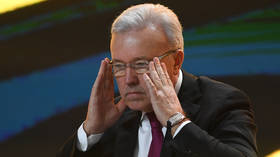Italy approves extradition of Russian governor’s son to US

A court in Italy approved the extradition of Artem Uss, the son of Krasnoyarsk Governor Alexander Uss, to the United States on Tuesday after he was arrested on accusations of evading sanctions and money laundering.
The 40-year-old was detained in Italy in October at the Milan Malpensa Airport on the orders of the US, which has charged him, as well as five other Russian nationals, with helping Moscow to evade Western sanctions. The accused allegedly purchased US military technology, selling it to sanctioned Russian entities as well as smuggling oil from Venezuela to customers in China and Russia.
Uss, who is now under house arrest near Milan, has repeatedly denied the allegations and his lawyer has told TASS news agency that they intend to appeal the US extradition decision. He noted that the Italian court had approved the extradition on two of four counts against his client and that an appeal will be filed within 15 days with the cassation court.
In October, a Russian court also ordered the arrest of Uss and placed him on the federal wanted list for a money laundering scheme of an especially large scale. Moscow has since demanded that Uss be extradited to Russia.
Uss has formally objected to being deported to the United States, which he says he last visited when he was just 14 years old. He has, however, officially asked to be extradited to Russia. His lawyers have also questioned the potential conditions of the businessman’s detention in the US and pointed out that the Russian could face discrimination in an American prison.
The final decision on extradition will be made by the Italian justice minister, and will be carried out only after all the relevant documents are signed. Under Italian law, the minister is allowed to override the court’s decision in such cases.
Governor Alexander Uss has claimed that the charges brought against his son as well as his arrest bear “obvious” political overtones. His son’s lawyers, meanwhile, have suggested that the US interest in extraditing the Russian is dictated by the desire to later use him in prisoner exchanges with Moscow, possibly hoping to swap him for Paul Whelan, who was convicted on charges of espionage in Russia in 2020.













